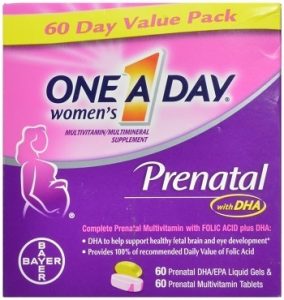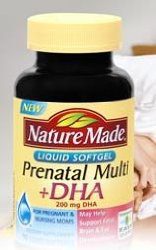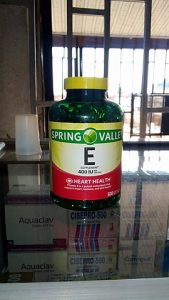Prenatal vitamins are crucial for pregnant women to get the certain nutrients that they need to stay healthy and have a healthy baby. They provide essential nutrients for both mom and baby. But there is some debate about when to start taking prenatal supplements.
Can you take prenatal vitamins without being pregnant? Some doctors say you should start taking supplements as soon as you know you are pregnant, while others say it is better to wait until the first trimester.
In this article, we will explore the benefits of knowing when to start taking supplements.

Prenatal Supplements For Pregnancy: Everything You Need To Know About Taking Prenatals While Pregnant
When To Start Taking It
Prepared to become a parent? Your gynecologist should see you, you should stop taking birth control, you should quit smoking, and you should take a prenatal vitamin.
An important element of preconception treatment is the use of prenatal vitamins important for your condition. A positive pregnancy test on the pee stick is a good indicator that you should begin taking prenatal supplements immediately.
In the first trimester, you don’t have to wait for your healthcare provider to recommend specific brands or even provide you with a prescription.
Pregnancy drains your energy reserves. Carrying a baby in your womb drains your body’s natural supplies, resulting in you feeling sluggish, nauseous, and weary during the nine months of pregnancy. That’s why it’s essential to take prenatal vitamins while you’re carrying a baby.
It’s easy to lack essential vitamins and minerals while pregnant because your baby gets everything it needs from you. If you start caring for yourself before you conceive, it will be much simpler for you and your unborn child to thrive.

What To Look For In Prenatal Vitamins For A Healthy Pregnancy
Some nutrients are truly crucial when expecting a baby because they help your child develop key organs and body systems, many of which begin growing in the first weeks. The American College of Obstetricians and Gynecologists (ACOG) recommends that expecting women consume these nutrients for a healthy pregnancy:
- Iron
The fetus receives blood and oxygen, the placenta is built, and you get the increased blood volume you require throughout pregnancy, thanks to iron. The increased number of red blood cells in your blood helps prevent anemia, which is common in pregnant women. Also, you can take prenatal vitamins with iron.
Premature birth and low birth weight are more common in babies whose mothers have anemia during pregnancy. This can be avoided by taking an iron supplement during pregnancy. However, iron is also known to cause constipation. If this occurs, consult your doctor about taking a stool softener. If you are unable to tolerate your supplement’s side effects, your doctor may recommend a prescription supplement instead.
- Folic Acid
Pregnant women need more folic acid than usual, so look for a supplement that contains extra folic acid. Your baby’s neural tube—the structure that eventually becomes the brain and spinal column—is made up of vitamin B. Spina bifida or anencephaly can occur if the neural tube is not fully completed during pregnancy. The neural tube defect occurs when the neural tube doesn’t close properly. Having enough folic acid before and during pregnancy can help prevent neural tube defects. The U.S. Public Office recommends 400 micrograms of folic acid every day to prevent neural tube defects.
A healthy neural tube is more likely to form when folic acid is taken. According to the American Academy of Pediatrics, folate in folic acid can minimize neural tube abnormalities by at least 50%, especially if the supplement includes methylated folate, which is easier to absorb.
All sexually active, reproductive women of childbearing age are advised by the Centers for Disease Control and PreventionTrusted Source to take 400 micrograms (mcg) of folic acid daily because of the its effectiveness, but only when taken at the correct time.
That way, even if you don’t think you’ll ever use folic acid, you’ll have it when you do! Pregnant women should take at least 600 micrograms (mcg) of folic acid daily.

- Calcium
Bones and teeth are being formed in your baby’s womb for a long time. They need a lot of calcium to do this, which implies that you should also have a lot of calcium in your healthy diet.
A deficiency in calcium when you are expecting a child or breastfeeding means that your kid will take whatever it needs from your bones. Bone loss can result as a result. Calcium is the building block for having healthy bones, including bones in your spinal cord. Make sure to incorporate calcium in your healthy diet to prevent spinal cord injuries and fractures.
- DHA
This omega-3 fatty acid found in fish oil is essential for pregnant women to ensure the health of their baby’s brain and spinal cord, eyes, and nervous system. Omega-3 fatty acids are also essential in preventing pre-term labor, increasing birth weight, and improving postpartum mood in new moms, so make sure you get your daily intake of a DHA supplement. Smarty Pants Prenatal Vitamins have DHA that supports fetal health, particularly the baby’s brain development. You can also find DHA from Nordic Naturals DHA.

- Zinc
Pregnant women should take zinc supplements to ensure their unborn child’s health and their own. Zinc is good for the growth and development of your baby’s cells and brain. As an added benefit from fetal brain development, this necessary mineral aids in the maintenance of your sense of taste and smell as well as the healing of wounds.
- Iodine
Iodine aids in the growth and development of the human body, particularly the brain. Pregnant and lactating women need to have more iodine because their babies acquire iodine from their moms. Choose iodine-rich foods while pregnant and breastfeeding, and take an iodine tablet daily.
- B Vitamins
Several different things have been found to help with pregnancy symptoms and lessen the likelihood of birth abnormalities. These include B6, B9 (Folic acid), and B12. Prenatal vitamins are critical because they ensure that both you and your unborn child receive the nutrients they need to grow and develop normally during pregnancy. B5, or pantothenic acid, is also important because it helps your body turn food into energy.
Carbohydrates are converted to glucose by thiamine, which is why it is necessary for human metabolism. The brain, neurological system, musculature, and heart all benefit from the presence of this vitamin throughout embryonic development or fetal development. Overall growth and the utilization of oxygen are dependent on riboflavin. In addition, the B12 vitamin aids in neural tube formation.
- Vitamin E
Taking vitamin E aids in the production and maintain healthy red blood cells. It’s the best vitamin to obtain healthy skin and eyes. Instead of using supplements, aim to get enough of it through your diet throughout pregnancy.
Because it enhances female cervical mucus, which keeps sperm alive longer, it may also help a couple’s chances of getting pregnant. It also helps the male reproductive system work better. Men and women undergoing fertility treatment can benefit from taking vitamin E.

- Vitamin C and D
Vitamin D is essential for bone health. Heart health may benefit from taking it as well. Vitamin D deficiency has been related to stunted growth, brittle bones, and a reduced ability to absorb calcium. It is also good for the immune system.
Fresh fruits and vegetables are also good sources of vitamin C. Collagen, cartilage, tendons, bones, and skin all benefit from vitamin C’s growth-promoting properties. It can also help with iron absorption.
We hope we have helped you with when to start taking supplements. Follow Family Hype for more health tips!
Frequently Asked Questions (FAQs)
Is It Okay To Take Prenatal Vitamins If You’re Not Pregnant?
When Is The Right Time To Start Taking Prenatal Supplements?
You should start taking a vitamin or supplement if you’re trying to conceive with your husband. You can start taking your daily supplement at least a month before pregnancy. Pregnant women will benefit the most from prenatal vitamins since they contain all the key nutrients they and their babies need. Just make sure to take the key nutrients needed. Aside from that, prenatal vitamins such as Vitamin D will also help to avoid the possibility of having a preterm birth. In general, supplements are important to prevent various complications associated with a child’s development. Start taking prenatal supplements to prepare your body for the upcoming days.
Which Prenatal Vitamins Are Considered The Best For Pregnancy?
What Are The Benefits Of Taking Prenatal Vitamins Before Pregnancy?
Pregnant women have unique nutritional demands. Even if you eat a balanced diet, it can be hard to get all the nutrients you need to carry a baby. Taking a vitamin before pregnancy can reap great benefits. Start taking prenatal vitamins to support a healthy pregnancy and reduce the chances of irregularities such as neural tube defects (spinal cord & brain), heart defects, limb deformities, and more. Vitamin deficiencies can also lead to pregnancy complications, which is why it’s advisable to take the best supplements.
Should You Take Prenatals At Night Or In The Morning?
There’s no time of the day that is much better than the other. Start taking prenatal vitamins after having your breakfast meal and after having your dinner–match your multivitamin with your healthy diet and lifestyle. Key nutrients are the reason why women take supplements. For some women, taking pregnancy supplements can help alleviate the feeling of nausea or dread associated with morning sickness. If you’ve been experiencing morning sickness with vomiting frequently, that’s a good reason to take a vitamin. Do note that not all prenatal vitamins can be taken on an empty stomach. If you’re not a fan of taking tablets, you can try gummy supplements instead. Gummies are just as effective and come in different flavors.
Is It Okay To Skip Your Vitamins For A Week?
Despite the importance of prenatal vitamins, one shouldn’t fully rely on these supplements for nutrients alone. Don’t worry if you miss taking a multivitamin for a few days or a week. You can still get important nutrients from other sources aside from your multivitamins, such as your breakfast, lunch, and dinner. But it’s advisable to take your pregnancy supplement daily, it’s just it’s not that big of a deal if you miss your supplement for a week or so. Consistency is the key if you start taking them for yourself.
Who Should Not Take Pregnancy Supplements?
Can I Get Pregnant While Taking Prenatals?
What Happens If You Do Not Take Prenatals?
How Long Do You Need To Take Pregnancy Supplements?
What Does A Prenatal Vitamin Do?
Should I Take a Prenatal Supplement Or Take Folic Acid?
Can I Take Prenatal Supplements Without Consulting A Doctor?
Is It Important To Take Prenatal Supplements Every Day?
Should Every Woman Take Prenatal Vitamins?
Last Updated on May 10, 2023 by Bernadine Racoma
DISCLAIMER (IMPORTANT): This information (including all text, images, audio, or other formats on FamilyHype.com) is not intended to be a substitute for informed professional advice, diagnosis, endorsement or treatment. You should not take any action or avoid taking action without consulting a qualified professional. Always seek the advice of your physician or other qualified health provider with any questions about medical conditions. Do not disregard professional medical advice or delay seeking advice or treatment because of something you have read here a FamilyHype.com.